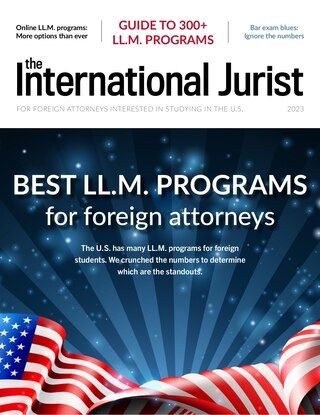By Desiree Jaeger-Fine
When your thoughts are not your thoughts
During your LL.M. you will be submitting writings in one form or another. I have witnessed quite a few cases in which a submitted piece of writing jeopardized an entire legal career. What had happened?
Plagiarism is what happened. Plagiarism is taken seriously in legal academia and many foreign LL.M. students are surprised by the vigor with which it is pursued. The Legal Writing Institute (LWI) defines plagiarism as “taking the literary property of another, passing it off as one’s own without appropriate attribution, and reaping from its use any benefit from an academic institution.”[1] What many LL.M. students misunderstand is that plagiarism does not include an element of intent. Whether you intended to cheat or simply forgot to properly attribute, whether you made an honest mistake or because you simply didn’t know – it is plagiarism.
If you are caught plagiarizing, you will be reported to whatever disciplinary mechanism the school has. This could lead to expulsion and/or could be recorded on your official record that will go to the bar authorities. Even if you were not expelled from law school, a plagiarism charge could prevent you from being admitted as an attorney afterwards.
The LL.M. application that haunts you forever
Once you are admitted to an LL.M. program, your application documents will be shredded and forgotten about, correct?
Not quite. According to the LSAC Rules Governing Misconduct and Irregularities in the Admission Process, “A charge of misconduct or irregularity [in the application] may be made prior to a candidate’s admission to law school, after matriculation at a law school, or after admission to practice.”[2]
State bar associations conduct thorough background checks as part of their character and fitness evaluation and may examine law school admission records. Your admission material will never be forgotten and can come back to haunt you.
Imagine earning your LL.M. degree, studying for the bar exam and passing the exam only to be denied the opportunity to practice law because you misrepresented yourself on your law school application.
So, what constitutes misconduct or an irregularity in the application? Those who are applying to an LLM degree will be held to the same high standards of truth, full disclosure, and accuracy that are applied to those who practice law.[3] In particular:
“Misconduct or Irregularity is the submission, as part of the law school admission process, including but not limited to regular, transfer, LL.M., and visiting applications, of any information that is false, inconsistent, or misleading; or the omission of information that may result in a false or misleading conclusion; or the violation of any law or regulation involving the law school admission process, including violations of LSAT test center regulations.” [4]
Here, as in the case of plagiarism, intent is not an element of a finding of misconduct or irregularity. If you are not specifically asked about a certain aspect of your past, you may need to disclose it anyway, as this case with a former LLM applicant at Northwestern Law shows.
Not attending class
If you can read the case book and study material on your own, there is really no need to attend classes regularly, right? Wrong.
Here are three reasons why every LLM student should attend classes regularly:
1. Consistent with ABA standard 308(a), regular class attendance is required as a condition for receiving course credit.[5] Each professor may supplement this general attendance requirement by announcing a more specific attendance requirement for a class. For example, they can add that the LLM student needs to arrive punctually. If an LLM student’s attendance is in violation of the attendance requirement, the LLM may be denied credit in the class, a memo may be added to the LLM student’s file, she may be dismissed from school, or any other appropriate action may be taken.
2. The LLM certificate for admission to the New York bar asks an LLM graduate to certify that she “was in good and regular attendance.”[6] The last thing an LLM graduate wants to do is being dishonest on the bar admission application. This could come back to haunt you years after admission to the bar.
3. International LLM students on a student (F-1) visa must also follow immigration laws, which specify that F-1 visa holders must be in a full-time schedule of classes.[7] This means that they must attend classes regularly. Not doing so can result in loss of your student visa.
* * * *
LL.M. students must adhere to the same high standards for truth, full disclosure, and accuracy that are applied to those who practice law. Not knowing what is required will not be an efficient defense.
Desiree Jaeger-Fine is principal of of Jaeger-Fine Consulting, LLC, a career management firm for international attorneys in New York, and author of “A Short & Happy Guide to Networking” (West Academic Publishing) and “A Short & Happy Guide to Being Hired” (West Academic Publishing).
[1] http://law.tamu.edu/docs/default-source/registrar-documents/plagiarism.pdf
[2] Id.
[3] https://www.lsac.org/applying-law-school/misconduct-irregularities
[4] Id.
[5]https://www.americanbar.org/content/dam/aba/publications/misc/legal_educ…
[6] https://www.nybarexam.org/Docs/LLMCertificateofAttendanceForm.pdf
[7] https://www.uscis.gov/working-united-states/students-and-exchange-visito…






